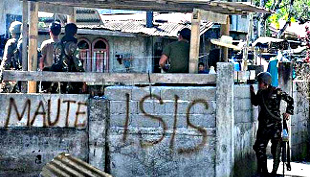Over the past few decades, several different nations have been described as the primary “magnet” for global jihadist fighters, attracting an influx of would-be recruits from across the planet. This was most glaring in Syria in recent years, where ISIS managed to carve out a Caliphate with an unheard of number of foreign fighters.
 But while officials are patting themselves on the back for putting ISIS on the ropes in Iraq and Syria, the sudden appearance of foreign jihadists participating in the local ISIS affiliate’s gains in the southern Philippines is fueling major fear across Southeast Asia that their region is the next hot spot.
But while officials are patting themselves on the back for putting ISIS on the ropes in Iraq and Syria, the sudden appearance of foreign jihadists participating in the local ISIS affiliate’s gains in the southern Philippines is fueling major fear across Southeast Asia that their region is the next hot spot.
The capture of Marawi in the Philippines was no small matter, with officials describing the capture of the city of 200,000 people as showing sophistication that has previously been unheard of for the Islamist factions in the area.
It’s not hard to see where that came from, as the local Islamists suddenly found a slew of new allies from across the Muslim world, many of them seasoned ISIS fighters from the Iraq-Syria fight, who are looking for a new place to set up shop, and are offering the local affiliates the benefit of their deep experience.
It’s a problem that could easily sneak up on the region’s armies, as they’ve got long histories of coping with the existing Islamist insurgencies with relative ease. Marawi shows that a relatively small influx experienced foreign fighters is a huge force multiplier for these groups, and changes them dramatically.
Philippines officials are eager to downplay the sudden ISIS capture of the city as a one-time thing, but with more and more foreign fighters showing up in the region, and plenty of large Islamist factions for them to work with, Southeast Asia could find itself suddenly awash with many problems like Marawi.


